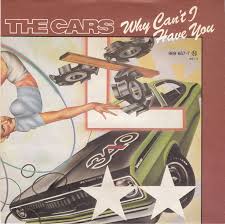Release
Cash Box reviewed the single, saying that "this moody piece of peculiarly American synth-pop is pure Ric Ocasek: broken romance lyrics, angular musical backing and a handful of melodic hooks." [2]
Although it did not reach the top 20 like its four predecessors, "Why Can't I Have You" managed to reach number 33 on the Billboard Hot 100, as well as number 11 on the Top Rock Tracks chart. [3] The song was the final single from Heartbeat City released in the United States; in the United Kingdom, however, a sixth single, "Heartbeat City", was released after "Why Can't I Have You".
It was also the final Heartbeat City video, and achieved Power Rotation on MTV. [4]
This page is based on this
Wikipedia article Text is available under the
CC BY-SA 4.0 license; additional terms may apply.
Images, videos and audio are available under their respective licenses.
